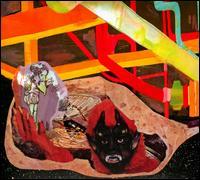
Wolf Parade
At Mount Zoomer (2008)
Greg
Holy side projects, Batman!
After only one full-length (and yeah, a few EPs), the guys in Wolf Parade got squirrelly and spread themselves thin over multiple projects and collaborations. Now, I loved their debut Apologies for the Queen Mary but I usually only go out of my way to follow side projects of long-loved artists, so I didn't pay much attention as these fellas were still new-ish in my radar. So I haven't heard more of Spencer Krug's hailed Sunset Rubdown than what has been available online, and I probably wouldn't have checked out much of Dan Boeckner's Handsome Furs if I hadn't been sent to me for review. And I couldn't tell you what Swan Lake or Frog Eyes sound like. I just think that Krug's eccentric tendencies and Boeckner's penchant for slower stripped tunes perform a nice balancing act within Wolf Parade. Frankly, I'm a little worried for the band's longevity, but for now let's revel in At Mount Zoomer.
After a long wait and a couple title switches (working titles: Pardon My Blues and Kissing the Beehive, the latter being the name of this album's closing track) the regrouped Wolf Parade finally settled on naming it after their personal recording studio. They produced themselves with drummer Arlen Thompson manning the boards, and while vocals and overdubs were done at Mount Zoomer, much tracking was also done at the church owned by their pals in Arcade Fire, where Neon Bible was put to tape. Also of note is that Dante DeCaro is not on this record. I was excited when I heard he joined up with the group shortly after Apologies because I liked his guitar work on early Hot Hot Heat stuff, but turns out he is mainly helping on the touring end (sometimes adding actual bass guitar) and should still be playing with them live in the future.
Wolf Parade is blessed with not one but two captivating lead singers, and Apologies found them volleying tunes. Zoomer's liner notes don't help out by crediting each for their songs, and honestly I sometimes have trouble telling them apart as they reach for higher notes with their post-Byrne, post-Brock yelps. The band claims it won't matter this time around, with improvisation jams birthing many of the songs, which were penned more by the collaborative unit than individuals. This approach brings with it a more full sound with every member musically filling all the gaps and less strict Boeckner/Krug alternating, but also less obvious standout tracks. I'm sure that when the band, mid-tracking, sent Sub Pop a warning of "no singles," they didn't mean that there aren't worthy tracks, but truth is they are harder to find.
Let's just start at the top with Boeckner's "Soldier's Grin," which maintains the herky-jerky feels they cultivated on their debut, until a swaying bridge with elastic guitar lines and swooshing synths changes things up and then Boeckner croons over hits for a strong finish. Yet it's Krug's "Call It a Ritual" that takes the band in a truly new direction with this piano-driven, odd-metered tune. It manages to maintain some sort of three-legged march, and as the second track, introduces a strengthened bond between him and other keys master Hadji Bakara. The two layer keyboard parts very effectively on the album, with one often playing a chorded rhythm part on electric piano or the like, while the other plays a more spacey âsynth' sound as a lead or countermelody as in "Language City." We find a lot more piano, electric piano and even harpsichord (Krug's twisting and odd "Bang Your Drum"), as well as more attention paid to bass synth sounds.
While it seemed Krug fronted the lion's share of the âhits' from the last record, Boeckner delivers here leading strong tracks, like the midtempo strut of "Fine Young Cannibals," and I love those sparse rhythmic Modest Mouse-influenced guitar stabs. While it takes a while to get rolling, one of Krug's strongest leads would have to be "California Dreamers." When the drums kick in double-time for the chorus, it don't get no better ("I thought I might have heard you on the radio / But the radio waves are like snow"), though the song loses steam a bit in the lengthy midsection. If there was a single this would be it, although it is six minutes.
The album's focus has to be the already-mentioned 11-minute closer "Kissing the Beehive" and finds the singers trading leads (I'm pretty sure) from verse to chorus, something I wish they did more of. The song starts out with a laid-back stomp, but when those synth-fronted hits strike about three-and-a-half minutes in, things get awesome. Pounding synth quarters under a couple cool guitar licks lead to a quote-unquote bridge with Krug yelping "Fire in the hole, fire in the hole!" Then there's a power-disco section and a short die-down before an outro with sneaky odd measures. You get the idea -- it's not one of those repetitive, ambient or mess-around long songs; it's packed to the brim with ideas and rock.
While ending superbly, I just can't find as much to instantly fall in love with as with Apologies. It's not a difficult record, just not as simple in its pleasures. I think I need more time with At Mount Zoomer, so time I shall spend. While a group of guys this talented can knock out something pretty good with ease, I can only dream of how great it could be if they focused their energies here. I sure hope Wolf Parade doesn't become the side project.